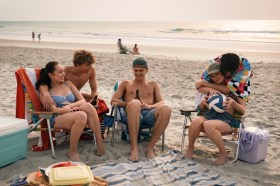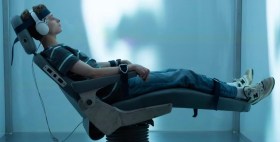Grace of Monaco opens with the famous quote from its adored subject, reflecting on the chasm between the perception of her life as an actress turned princess, and the troubles of its reality. ‘The idea of my life as a fairy tale is itself a fairy tale,’ she suggested, as director Olivier Dahan (La Vie en Rose) and writer Arash Amel (Erased) make a point of making plain. The statement of the idea failing to match actuality is not only the film’s main concern, but also its primary outcome.
Charting the tumultuous events of 1962 and 1963, the first feature biopic of the beloved figure tells of a woman trapped by marriage, motherhood and governmental manoeuvring. Six years after making her last cinema appearance in High Society, Grace (Nicole Kidman, The Railway Man) wishes to accept the invitation of Alfred Hitchcock (Roger Ashton-Griffiths, TV’s Game of Thrones) to lead his forthcoming film Marnie. Alas, as her husband, Prince Rainier III (Tim Roth, Möbius), trifles with French President Charles de Gaulle (André Penvern, Le Chef) over taxes and territory, returning to the Hollywood spotlight proves less important than securing the future of her adopted country.
A wealth of interesting personal and political stories dwells in the facts of the narrative, of an idyllic facade crumbling, a public heroine being reinvented, and of a small principality punching above its weight; however the tales told in the film are stripped of their intrigue in favour of relentless exposition. Whether unconvinced of the collective memory doing Kelly justice more than three decades after her death, or simply plagued by average writing, the screenplay instead chooses to render the events and characters in as melodramatic a fashion as possible, mimicking the timing and execution of a soap opera.
Developments that see a palace helper (Parker Posey, Price Check) suspected of wrongdoing and a priest (Frank Langella, Robot & Frank) merely an over-burdened confidante do little to deepen or strengthen the slight and unsubtle effort, nor does direction that evidently loves the film’s central character and actress, but has little idea what to do with either. Extreme close ups of Kidman’s face may be intended to draw the audience in to Grace’s every moment of discomfort and dismay as well as the eventual triumph over adversity that must come, yet when such an intimate view is afforded of the character conjuring facial expressions listed on cards, all in the middle of an extended My Fair Lady-like makeover and deportment sequence, evoking the intended seriousness and sympathy is far from a foregone conclusion.
To Kidman’s credit, as shot with the softest of focus and in the sunniest of lighting, she plays as blank and blatant as the material calls for. She aims to channel serenity amid suffering, but aloof stares and constant dialogue reminders would never be able conjure the pain supposedly simmering underneath. For all the film’s attempts, both stated and otherwise, to peel away the pretence surrounding its subject, it repeatedly casts its leading lady into the role of a flimsy archetype. The only perceptions shattered in Grace of Monaco are of the director’s luck with biopics, and of cinema’s ability to pay tribute to its legends. The sad reality presented is one of a movie lush in appearance but empty in content.
Rating: 2 ½ out of 5 stars
Grace of Monaco
Director: Olivier Dahan
France / USA / Belgium / Italy, 2014, 103 mins
Release date: June 5
Distributor: eOne
Rated: PG
Actors:
Director:
Format:
Country:
Release:





